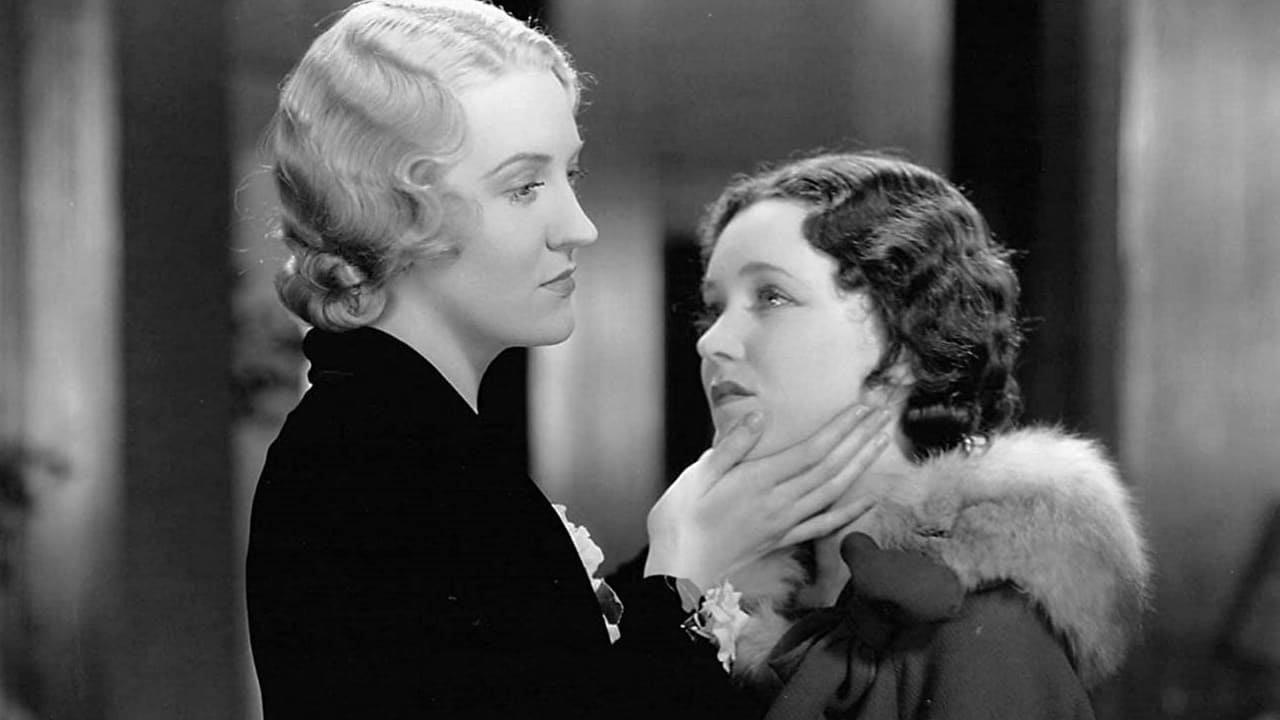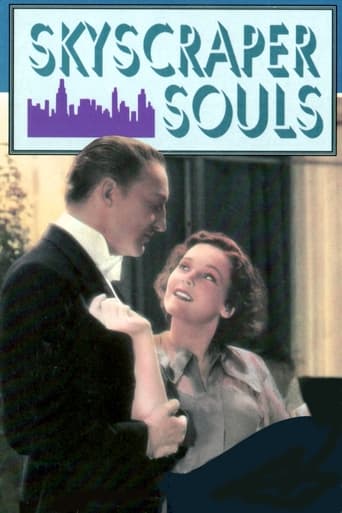

Just so...so bad
... View MoreThe film makes a home in your brain and the only cure is to see it again.
... View MoreExcellent characters with emotional depth. My wife, daughter and granddaughter all enjoyed it...and me, too! Very good movie! You won't be disappointed.
... View MoreThere's no way I can possibly love it entirely but I just think its ridiculously bad, but enjoyable at the same time.
... View MoreThis was a great showcase for Warren William's pre-code amorality. He plays a financial wheeler dealer who apparently feels no need to examine his conscience or alter his slippery Roaring Twenties' ethics in the face of the Depression's financial pressures. In addition to the joy of seeing William strut his stuff as the owner of a new NYC building that's even taller than the Empire State Building, the viewer is allowed to gaze at some really interesting art deco touches, such as a swirling lobby floor shot from above by the masterful cinematographer, William Daniels, and, among other stylish set design details, the almost seamless doorways with a curved pattern that resemble 33 1/3 gold records cut in half, and, of course, the sleek Mr. William himself.However, for me, the most enjoyable thing about this film were the supporting players: Verree Teasdale, who gives a truly nuanced, sympathetic and ultimately poignant performance as William's longtime mistress and right hand gal. This role would probably not even exist once the production code took hold. She also lends her considerable elegance to this part in a series of lovely high end "working girl" outfits.Hedda Hopper--yes, before she took up her pen--who plays the bemused, estranged wife of Warren William who shows up occasionally to comment cynically on his behavior and to ask for some dough. Too bad Ms. Hopper didn't have more chances to play this sort of woman-of-the-world role. Perhaps we could've remembered her more vividly as a actress rather than a gossip columnist. She too is surprisingly elegant here.Edward Brophy, who plays an uncredited part as a besieged man on an elevator who interjects some needed earthiness and humor in the story whenever the rather earnest secondary leads, Norman Foster & Maureen O'Sullivan, threaten to annoy this viewer with their pallid pursuit of a banal skein of the story.Miss O'Sullivan, who was very early in her MGM career, injects her somewhat underwritten role with a fleeting vibrancy and self-delusion, but this unfortunately turns into an unattractive tendency to whine and simper about wanting to marry - as long as a fellow has a good bank account. This rather realistic attitude probably rang true to many in the Depression era audience, but the script never fully developed her character, unfortunately, and probably couldn't with such a large ensemble cast.Among the most ironic of situations is Jean Hersholt as a jeweler who in the process of doing something good - showing a girl (Anita Page) that she is good for more than sex, she is good for a lifetime of companionship - unknowingly kills somebody. The only person who knows cannot tell or rescue the person, still alive, or else that person will be admitting to a host of indiscretions to which they were a party. Thus this person just staggers away, lost.Catch it if you can. You'll notice many similarities to Grand Hotel, although this film came out first. It stars many of MGM's lesser players, and speaks more directly to American Depression era audiences than Grand Hotel ever could.
... View MoreMost of the reviews have overlooked an important supporting player -- the building. I haven't yet determined the shooting site used but suspect Radio City was used in part. This deco dazzler did as much as the plot to convey the era and style of the story. The details of the doors and furniture were just as inviting as the story itself.Perhaps missed by viewers were the elevator clicks used to announce car arrivals -- no ding-dong, bing, or bells for the Seacoast Building The acting far outshone the cheesy fare of the period - With the exception of sight gag in the drugstore it was conveyed by and for adults.The print I viewed on AMC (I think) was immaculate with great sound. Only wish a DVD version were available.
... View MoreBack in the early 30's, Maureen O'Sullivan was the quintessential "good girl who wants to be bad", which is to say, she seemed prim and proper on the surface, but a powerfully sexy woman lay right underneath that surface, who would only come out for the right guy--or sometimes the wrong guy. Though she is not exactly the star of this movie, she did get second billing after Warren William, in spite of being so new to the motion picture biz. This was probably in response to her having appeared as Jane in the first Weissmuller Tarzan film, not long before. That remains her best role--she is essentially the protagonist in the first two Tarzan movies--she's the one who is changing, casting aside the sexual mores of her society, and joining Tarzan in his idyllic state of noble savagery.In the urban jungle of "Skyscraper Souls", she plays a less idyllic character, wanting to enjoy both sexual passion and social respectability, along with a decent income. Nobody can offer her everything she wants, so she's left with two imperfect choices--the poor young clerk she likes, who will offer marriage. And the sexy ruthless tycoon she REALLY likes, who will take her as his "ward" (that is to say, his mistress) and possibly cast her aside in a decade or so, assuming he isn't too old to care by that point. Of course, she'd be set for life, even if that happened. But by the point in the film where she gives into him, she almost seems past caring about that. She's tried to follow the rules, and society has only penalized her for it. The man who supposedly loves her doesn't trust her, and she's feeling powerfully drawn to David Dwight, who understands her perfectly, and doesn't stand in judgment of anybody--least of all himself. He's a bastard, who destroys people to get what he wants--but he doesn't pretend to be anything else. He doesn't care about respectability or morality. Very few rich men truly do, but most like to at least pretend.This pre-code film has it both ways, regarding the denouement of this particular sub-plot--you can, if you wish, believe that Lynn is saved from the proverbial Fate Worse Than Death, by the not entirely selfless intervention of her friend, Dwight's former mistress. But in truth, a number of days have passed since Lynn gave in to Dwight's advances, she seems awfully comfortable in his embrace, she's wearing clothes he bought for her, and is obviously living in his penthouse. Dwight is not the kind of man who is going to wait until he gets her on the yacht to have his pleasure. He's already gotten what he--and she--wanted. Even in the pre-code era, this is a bit too subversive, which is why the movie deftly clouds the issue of whether they've had sex or not. But there can be no doubt of her eagerness--by this point, she wouldn't leave Dwight for the bank clerk, even if the clerk could offer her everything she asked for. With Dwight gone, she'll marry her bank clerk, and raise a family, and perhaps count herself lucky to have gotten to experience a bit of the high life before settling down. But one wonders if the bank clerk will end up wondering why their first kid doesn't look like him. I'm reading a great deal into this, of course. I really hated the bank clerk, btw. ;-)
... View MoreUtterly ruthless & immoral, the owner of New York's tallest building plots & schemes to keep control of his creation, trampling upon anyone who gets in his way. Others working in the great colossus also live lives of drama & everyday excitement. All these SKYSCRAPER SOULS will soon find themselves bound together by greed, lust, betrayal, suicide & murder.Practically screaming its pre-Production Code status, this neglected film is rather fascinating in the risqué development of its plot. Sex, both leering & suggested, plays an important role in the story. By making its hero a man both charming & completely treacherous, open to any underhand suggestion, it makes a lie out of Louis B. Mayer's assertion that all of MGM's product was family friendly. Even today, this is potent, powerful material. And absolutely engaging.Warren William is almost distressingly good as the unscrupulous building owner, around whom much of the action revolves. His blunt dishonesty almost makes chicanery respectable.The rest of the cast is equally proficient:Maureen O'Sullivan as a naive young secretary lusted over by William & loved by brash bank clerk Norman Foster.Gregory Ratoff, hilarious as a harried dressmaker.Anita Page as a brash prostitute/model beloved by noble jeweler Jean Hersholt.Verree Teasdale, William's mistress for 12 years, finally pushed to the breaking point.Wallace Ford as a radio announcer, tragically driven to desperation by his love of unhappily married Helen Coburn.George Barbier as a jolly fat debauchee, one of William's eventual financial victims.And Hedda Hopper, William's absent, knowing wife - very content with his money, but not his company.Movie mavens will also recognize Billy Gilbert as a lobby cigarette stand owner, Edward Brophy & Doris Lloyd as the man & woman in the elevator.
... View More